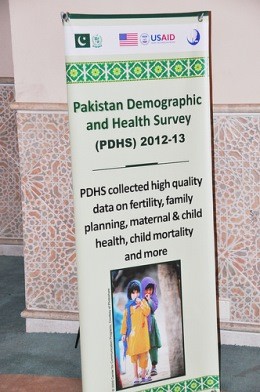
For Immediate Release
Ambassador Richard Olson attended the release of Pakistan's National Institute for Population Studies Demographic and Health Survey (PDHS) for 2012-13 at a ceremony at the Serena Hotel in Islamabad. State Minister for National Health Services, Regulation and Coordination Saira Afzal Tarar was also present at the event.
Ambassador Olson highlighted the ongoing partnership between the United States and Pakistan to improve the health of the Pakistani people in remarks he delivered at the release ceremony. He remarked that, "More women now receive prenatal care. More births are assisted by a skilled provider. And more babies are delivered in a health facility. The focus on women and children is fundamental because healthy women and children develop a healthy society."
Since 2002, the United States has provided $320 million in support of Pakistan's health sector. The U.S. Agency for International Development launched its flagship Maternal and Child Health Program in June 2013 to help improve the health and well-being of women and children and to expand coverage to the most marginalized and hard to reach populations.
In addition to the Maternal Child and Health Program, the United States is supporting Pakistan's efforts to expand its healthcare services through a number of programs. For example, the United States Government financed a new gynecology ward at the Jinnah Postgraduate Medical Center in Karachi that provides care to 140,000 underserved women and trains 1,300 health care professionals annually. The United States is also funding construction of a new $10 million public hospital in Jacobabad which will serve 1.2 million residents of northern Sindh, southern Punjab, and eastern Balochistan.
The Demographic and Health Survey (DHS) has been used by 90 countries to establish a standardized way to provide data for health and population policies and programming.
Timely collection, analysis and use of reliable demographic and health data are crucial for planning, monitoring and evaluating health programs. Data for this survey was collected from a nationally representative sample of nearly 13,000 households, and more than 15,000 women and 3,000 men between the ages of 15 and 49 years were interviewed.







Comment
Make a general inquiry or suggest an improvement.